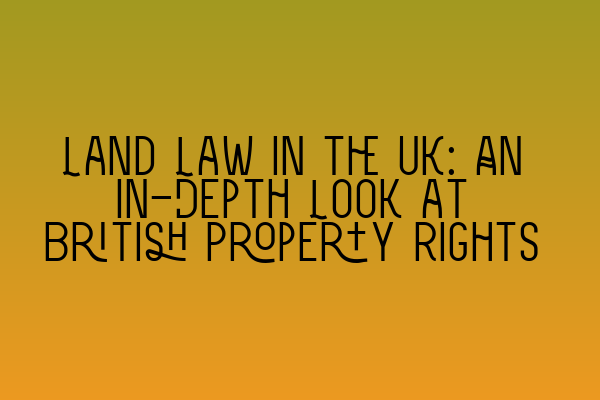Land Law in the UK: An In-Depth Look at British Property Rights
Welcome to the SQE Property Law & Land Law blog! Today, we are diving deep into the world of land law in the UK. Whether you are a property owner, a tenant, or just someone interested in the intricacies of property rights, this article will provide you with a comprehensive understanding of British property law.
Understanding Property Rights
Property rights form the foundation of our legal system, providing individuals and businesses with the ability to own, use, and transfer land and buildings. In the UK, property rights are governed by a complex framework of legislation and case law, which can often be overwhelming for those unfamiliar with the legal landscape.
To simplify the process, we have outlined the different types of property rights that exist in the UK:
1. Freehold
Freehold is the absolute ownership of land and buildings, giving the owner full control and rights over the property. Freehold ownership lasts indefinitely and can be passed down through generations. If you own a freehold property, you have the freedom to make changes and improvements to your property without seeking permission from anyone else.
For more information about freehold ownership and its implications, you can read our related article on Updates in UK Property Laws: Key Changes and Implications.
2. Leasehold
Leasehold is a common form of property ownership in the UK, particularly for flats or apartments. When you own a leasehold property, you have a fixed-term agreement (typically 99 or 125 years) with the freeholder, granting you the right to occupy the property for the duration of the lease. However, you do not own the land outright, and there are certain restrictions on what you can do with the property.
To understand the legal challenges that can arise in leasehold transactions, our comprehensive guide on Legal challenges in property transactions: A comprehensive guide offers valuable insights.
3. Tenancy
Tenancy refers to the legal agreement between a landlord and a tenant for the rental of a property. While tenants do not own the property, they have the right to use it for an agreed period of time and must adhere to the terms and conditions outlined in their tenancy agreement. Tenancy laws provide protection to both landlords and tenants, outlining their respective rights and responsibilities.
If you’re a tenant or landlord seeking essential guidelines on lease laws, we encourage you to check out our informative article on Navigating Lease Laws in the UK: Essential Guidelines for Tenants and Landlords.
Key Principles of Land Law
Land law is a complex area, but there are several key principles that underpin its operation in the UK:
1. Registration
In the UK, land registration is crucial for establishing legal ownership and protecting property rights. The Land Registry is responsible for maintaining the register of title for all registered land, ensuring transparency and clarity in property transactions.
2. Covenants
Covenants are legal obligations or restrictions that attach to the land and bind subsequent owners. They can be positive (requiring the owner to do something) or restrictive (restricting the use or development of the land). It is vital to understand the covenants affecting a property before making any commitments.
3. Easements
Easements are rights that one person has over another person’s land, such as a right of way or a right to access services. Easements can exist by express agreement, such as through a deed, or may arise by implication or necessity.
4. Mortgages
Mortgages are a common way for individuals and businesses to secure loans for the purchase of property. A mortgage gives the lender a legal charge over the property, which provides security against default on loan repayments.
If you want to learn more about avoiding common pitfalls in property law or need revision tips to ace your exam preparation, our articles on Dominate Property Law Questions: Avoiding Common Pitfalls and Land Law Revision Tips: Ace Your Exam Preparation offer valuable advice.
Conclusion
Understanding land law is essential for all property owners, tenants, and anyone involved in property transactions. By grasping the different types of property rights and the key principles of land law, you can navigate the legal landscape with confidence and protect your interests.
If you need further assistance or have any questions regarding property law in the UK, do not hesitate to contact SQE Property Law & Land Law. Our team of solicitors and property law experts are here to provide you with the expert advice you need.
